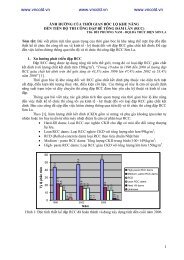Civil Engineering Project Management (4th Edition)
Create successful ePaper yourself
Turn your PDF publications into a flip-book with our unique Google optimized e-Paper software.
Preparing contract documents 55<br />
matters are considered below. For the standard ICE conditions entries will be<br />
required in the appendix to the Form of Tender but for the ECC conditions it<br />
will be necessary to decide which options are to be included as part of the conditions<br />
of contract as well as making appropriate entries in the Contract Data.<br />
The Defects Correction Period must be stated. This is the period during<br />
which the contractor must repair any defects in the works resulting from his<br />
workmanship. The period is usually 52 weeks for major construction but may<br />
be more or less depending on whether there is running plant involved or how<br />
soon defects may become apparent.<br />
A Performance Bond is usually required where the employer feels he needs<br />
financial protection against a contractor failing to complete the works either<br />
due to lack of resources or financial instability. The size of the bond should cover<br />
having to re-tender and any extra costs to complete. The value should thus be<br />
chosen to suit the work but should not generally exceed 10 per cent of the value<br />
of works. Bonds are, however, relatively expensive to supply and thus put up<br />
prices and so may be considered unnecessary if the contractor is substantial,<br />
or part of a large group who can supply a parent company guarantee.<br />
Insurance against third party risks needs to have a value set with reference<br />
to the likely risks of damage. In a rural area this may be small, but works near<br />
a major industrial complex may need a higher level of cover. Normally it is the<br />
contractor who provides insurance cover both for the works and third parties<br />
but sometimes employers prefer to provide these insurances to save costs.<br />
This can lead to problems when the cover provided does not fully represent<br />
the risks which arise.<br />
The Time for Completion of the works should be set at a reasonable period<br />
given a proper level of resources. In many cases there will be a need for sections<br />
of the works to be defined and separate times for completion to be set for<br />
each of these. Sections may be needed if other contractors are to have access to<br />
the site (e.g. for plant installation) or if parts of the works are needed early.<br />
Since the employer will be kept from using his works and may incur other<br />
costs if the contractor fails to complete on time it is usual to set liquidated<br />
damages to compensate him for his loss. These must be calculated as a genuine<br />
pre-estimate of the loss based on the value of the works output and other costs<br />
anticipated.<br />
Most contracts provide that a portion of the money due to a contractor each<br />
month be retained by the employer. This retention has to be set and is usually<br />
a percentage (often 5 per cent) of the value of works certified up to a limit. The<br />
intention is to provide cover for defects and outstanding work but retention<br />
is unpopular with contractors who point out that bonds and money yet to be<br />
certified for payment provide funds should this be necessary.<br />
5.5 Writing specifications<br />
In writing specifications care must be exercised to ensure consistency of requirements<br />
throughout and conformity with what is written in other documents.


















